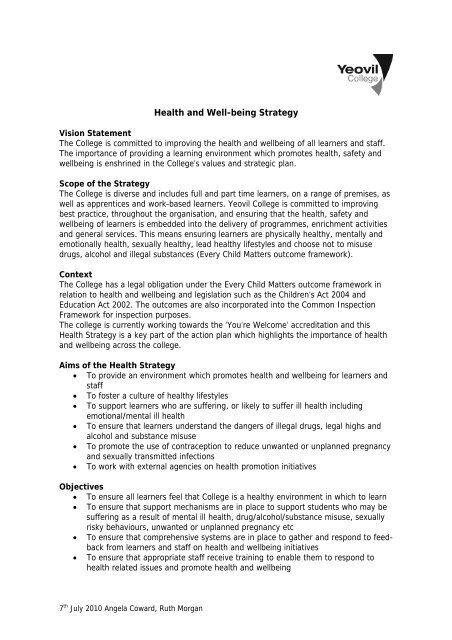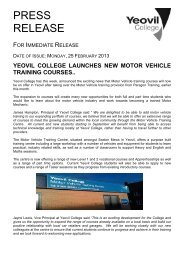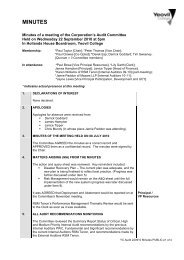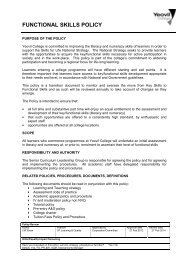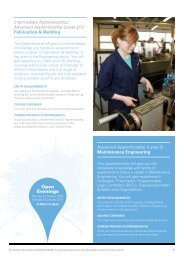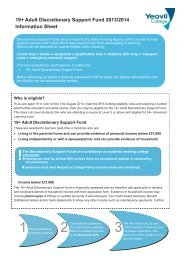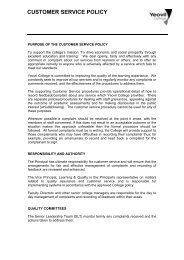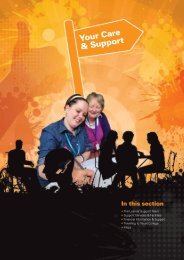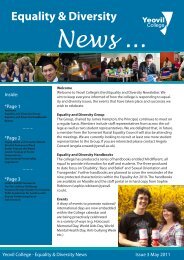Health and Well-being Strategy - Yeovil College
Health and Well-being Strategy - Yeovil College
Health and Well-being Strategy - Yeovil College
You also want an ePaper? Increase the reach of your titles
YUMPU automatically turns print PDFs into web optimized ePapers that Google loves.
<strong>Health</strong> <strong>and</strong> <strong>Well</strong>-<strong>being</strong> <strong>Strategy</strong>Vision StatementThe <strong>College</strong> is committed to improving the health <strong>and</strong> well<strong>being</strong> of all learners <strong>and</strong> staff.The importance of providing a learning environment which promotes health, safety <strong>and</strong>well<strong>being</strong> is enshrined in the <strong>College</strong>’s values <strong>and</strong> strategic plan.Scope of the <strong>Strategy</strong>The <strong>College</strong> is diverse <strong>and</strong> includes full <strong>and</strong> part time learners, on a range of premises, aswell as apprentices <strong>and</strong> work-based learners. <strong>Yeovil</strong> <strong>College</strong> is committed to improvingbest practice, throughout the organisation, <strong>and</strong> ensuring that the health, safety <strong>and</strong>well<strong>being</strong> of learners is embedded into the delivery of programmes, enrichment activities<strong>and</strong> general services. This means ensuring learners are physically healthy, mentally <strong>and</strong>emotionally health, sexually healthy, lead healthy lifestyles <strong>and</strong> choose not to misusedrugs, alcohol <strong>and</strong> illegal substances (Every Child Matters outcome framework).ContextThe <strong>College</strong> has a legal obligation under the Every Child Matters outcome framework inrelation to health <strong>and</strong> well<strong>being</strong> <strong>and</strong> legislation such as the Children’s Act 2004 <strong>and</strong>Education Act 2002. The outcomes are also incorporated into the Common InspectionFramework for inspection purposes.The college is currently working towards the ‘You’re Welcome’ accreditation <strong>and</strong> this<strong>Health</strong> <strong>Strategy</strong> is a key part of the action plan which highlights the importance of health<strong>and</strong> well<strong>being</strong> across the college.Aims of the <strong>Health</strong> <strong>Strategy</strong>• To provide an environment which promotes health <strong>and</strong> well<strong>being</strong> for learners <strong>and</strong>staff• To foster a culture of healthy lifestyles• To support learners who are suffering, or likely to suffer ill health includingemotional/mental ill health• To ensure that learners underst<strong>and</strong> the dangers of illegal drugs, legal highs <strong>and</strong>alcohol <strong>and</strong> substance misuse• To promote the use of contraception to reduce unwanted or unplanned pregnancy<strong>and</strong> sexually transmitted infections• To work with external agencies on health promotion initiativesObjectives• To ensure all learners feel that <strong>College</strong> is a healthy environment in which to learn• To ensure that support mechanisms are in place to support students who may besuffering as a result of mental ill health, drug/alcohol/substance misuse, sexuallyrisky behaviours, unwanted or unplanned pregnancy etc• To ensure that comprehensive systems are in place to gather <strong>and</strong> respond to feedbackfrom learners <strong>and</strong> staff on health <strong>and</strong> well<strong>being</strong> initiatives• To ensure that appropriate staff receive training to enable them to respond tohealth related issues <strong>and</strong> promote health <strong>and</strong> well<strong>being</strong>7 th July 2010 Angela Coward, Ruth Morgan
<strong>Health</strong> - Where are we now?The Governing Body <strong>and</strong> Senior Leadership Team are committed to ensuring that the<strong>College</strong> operates with a clear commitment to providing a healthy environment forstudents <strong>and</strong> staff. They are also committed to supporting <strong>and</strong> local <strong>and</strong> national healthinitiatives such as Chlamydia screening <strong>and</strong> HPV vaccinations.a. Policy <strong>and</strong> ProcedureThe <strong>College</strong> has a robust <strong>Health</strong> <strong>and</strong> Safety policy which is reviewed <strong>and</strong> approved by theGoverning Body regularly. There is also a Student Support Services Referral Protocolwhich sets out procedures for making <strong>and</strong> receiving referrals to external health agenciessuch as School Nursing team.b. Designated StaffThe <strong>College</strong> has a Student <strong>Health</strong> Adviser who is part of Student Support Services whoworks 30 hours a week <strong>and</strong> a Student Support Adviser who offers support to studentswith mental ill health <strong>and</strong> emotional difficulties. Human Resources Department isresponsible for meeting the health needs of staff.c. Action PlanThe <strong>College</strong> has an action plan for health linked to the You’re Welcome quality criteriawhich incorporates actions resulting form undertaking the <strong>Health</strong>y FE Review AssessmentTool. It is reviewed on a regular basis with the college’s local NHS lead <strong>and</strong> Vice PrincipalLearning <strong>and</strong> Quality.d. PublicationsThe <strong>College</strong> distributes information through Tutorial Bulletins, News in 90, Team Brief <strong>and</strong>on Moodle through the new ‘Do you need help?’ button.Information leaflets from external agencies are also available to both students <strong>and</strong> staff.One of the key actions from the You’re Welcome assessment is to improve thepublications available to students.e. TrainingAll members of the Student Support Services team undertake training in basic sexualhealth <strong>and</strong> specific courses as appropriate to their role. The Student Union Executive aretrained through C-Card to be able to issue condoms to students who are signed up to thescheme.f. Record KeepingConfidential records are kept by the Student <strong>Health</strong> Adviser for all students accessing theservice. Records are also kept on the password protected confidential traffic light systemwhich holds data about students’ additional needs.g. Links with external agenciesThe <strong>College</strong> has well established <strong>and</strong> effective links with:7 th July 2010 Angela Coward, Ruth Morgan
• Somerset NHS <strong>and</strong> Dorset NHS• Somerset School Nursing team• Somerset Contraception <strong>and</strong> Sexual <strong>Health</strong> Service• <strong>Yeovil</strong> Pregnancy Crisis Centre• NHS walk in clinic – <strong>Yeovil</strong>• Children <strong>and</strong> Adolescent Mental <strong>Health</strong> Service• Somerset Partnership (Adult mental health services)h. Student ConsultationThe Student Union have been consulted about aspects of the You’re Welcome assessmentcriteria.i. Student Help LinksThe <strong>College</strong> has developed a ‘Do you need help?’ button on the Moodle site which can beaccessed by staff <strong>and</strong> students. This allows contact with members of the Student SupportTeam by confidential e-mail <strong>and</strong> links to internal <strong>and</strong> external health support, includingrelevant web-sites.<strong>Health</strong> – Where do we want to be?a. Policy <strong>and</strong> ProcedureTo develop a <strong>Health</strong> Policy, which incorporates the college’s commitment to promotinghealth <strong>and</strong> well<strong>being</strong> amongst students <strong>and</strong> staff.b. Designated StaffTo maintain a team of designated staff, trained to appropriate levels, who are able toprovide health advice <strong>and</strong> support on all <strong>College</strong> premises.c. Action PlanTo maintain <strong>and</strong> regularly review a <strong>Health</strong> Action Plan which includes clear <strong>and</strong> achievableactions for the <strong>College</strong> but also compares us to organisations with outst<strong>and</strong>ing practicewithin the sector.d. PublicationsTo develop publications which promote health <strong>and</strong> well<strong>being</strong> <strong>and</strong> signpost students <strong>and</strong>staff to relevant external health agencies. To provide multi lingual information sheets <strong>and</strong>details of external clinic times <strong>and</strong> contact information.e. Training <strong>and</strong> Development7 th July 2010 Angela Coward, Ruth Morgan
To use tutorial sessions to provide an opportunity to communicate to learners messagesabout health <strong>and</strong> well<strong>being</strong>.To deliver tutorial sessions in an interactive way <strong>and</strong> involve experts from externalpartners.To consider how health <strong>and</strong> well<strong>being</strong> issues can be embedded within tutorial sessions<strong>and</strong> involve learners in shaping how these messages are delivered.To consult with staff <strong>and</strong> learners, develop a programme on health <strong>and</strong> well<strong>being</strong> as acore part of enrichment activities to further develop participants' knowledge on the keyissues.To develop training for tutors on how to inform students about making informed choicesaround health <strong>and</strong> well<strong>being</strong>.To include sessions on health <strong>and</strong> well<strong>being</strong> in new staff induction training.f. Record KeepingTo continue to maintain <strong>and</strong> develop a confidential password protected database whichrecords health needs of students.g. Links with External AgenciesTo identify an appropriate contact within the PCT, Local Authority <strong>and</strong> other keystakeholders, such as local secondary schools, to discuss health <strong>and</strong> well<strong>being</strong> issues.h. Student ConsultationTo improve consultation though focus groups, feed-back questionnaires etcTo carry out a cross-college survey based on Every Child Matters, using Survey Monkey<strong>and</strong> disseminate findings to students.To carry out Qualitative <strong>and</strong> Quantitative surveys of students engaging with the service.To develop a number of case studies which can be used in promotion.To develop a feedback sheet for students to complete after accessing the service.To carry out ‘mystery shopper’ surveys throughout the year.i. Student Help LinksTo further develop the ‘Do you need help?’ button on Moodle which is easily accessible tostudents <strong>and</strong> staff, regularly up-dated with key information <strong>and</strong> links <strong>and</strong> enablesstudents to request help in a confidential manner.j. CurriculumTo ensure that a strategy is in place to co-ordinate the embedding of health <strong>and</strong>well<strong>being</strong> focused activities into learner programmes <strong>and</strong> maximise the opportunitiesacross the curriculum.To consider the use of external partners in the delivery where they can make deliverymore effective.Development <strong>and</strong> ReviewThe impact <strong>and</strong> effectiveness of the <strong>Health</strong> <strong>Strategy</strong> to be reviewed annually by SLT.The impact measures of the strategy will include:Full representation of health <strong>and</strong> well<strong>being</strong> in the <strong>College</strong> SAR <strong>and</strong> QIP.Development <strong>and</strong> review of health <strong>and</strong> well<strong>being</strong> at Faculty level.7 th July 2010 Angela Coward, Ruth Morgan
Policy ReviewThe <strong>College</strong> will undertake working with other partnership <strong>College</strong>s e.g. through theSomerset <strong>Health</strong>y <strong>College</strong>s Network <strong>and</strong> the You’re Welcome Trailblazer colleges to sharegood practice.7 th July 2010 Angela Coward, Ruth Morgan


